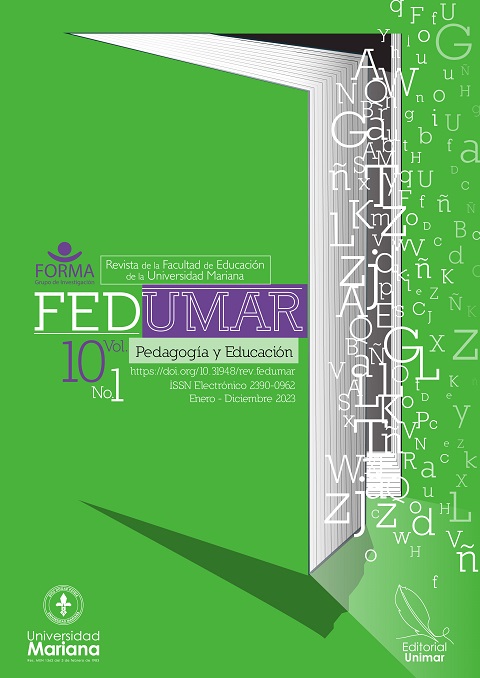Voice recognition for literacy within the framework of inclusion
DOI:
https://doi.org/10.31948/rev.fedumar10-1.art-8Keywords:
literacy, inclusion, global methodologies, educational software and hardware.Abstract
The research seeks to analyze information collected about the literacy process of a tenth grade student, who has a medical diagnosis of moderate mental retardation, enrolled in a public rural educational institution in the city of Pasto, through the use of digital educational resources of free use and available on the internet and the design and development of software and hardware taking into account the global method, this process began in 2023, however has antecedents in the year 2022, to develop this research the qualitative paradigm and the case of study is the research method are used case; the results obtained are partial and have demonstrated the advantages of using new technological trends in education.
Author Biography
Blanca Yanneth Revelo Quiroga, Institución Educativa Municipal Morasurco
Estudiante del doctora en Pedagogía; Magister en comunicación educativa; profesora de la Institución Educativa Municipal Morasurco, Nariño, Colombia.
References
Area-Moreira, M. y Adell-Segura, J. (2021). Tecnologías digitales y cambio educativo. Una aproximación crítica. Universidad Autónoma de Madrid y Red Iberoamericana de Investigación sobre Cambio y Eficacia Escolar (RINACE). https://doi.org/10.15366/reice2021.19.4.005
Decreto 19 de 2012. (2012, 10 de enero). Presidencia de la República de Colombia. https://www.funcionpublica.gov.co/eva/gestornormativo/norma.php?i=45322
Decreto 1421 de 2017. (2017, 29 de agosto). Ministerio de Educación Nacional. https://www.mineducacion.gov.co/portal/normativa/Decretos/381928:Decreto-1421-de-agosto-29-de-2017
Dewey, J. (1997). Experience and Education. Kappa Delta Pi Lecture.
Jiménez-Chaves, V. E. (2012). El estudio de caso y su implementación en la investigación. Revista Internacional de Investigación en Ciencias Sociales, 8(1), 141-150.
Ledesma-Ayora, M. (2014). Análisis de la teoría de Vygotsky para la reconstrucción de la inteligencia social. Universidad de Salamanca.
Ministerio de Educación Nacional (MEN). (2017). Documento de orientaciones técnicas, administrativas y pedagógicas para la atención educativa a estudiantes con discapacidad en el marco de la educación inclusiva. Ministerio de Educación Nacional.
Montessori, M. (2004). The Montessori method: The Origins of an Educational Innovation: Including an Abridged and Annotated Edition of Maria Montessori's The Montessori Method. Rowman & Littlefield Publishers, Inc.
Muñiz, M. (s.f.). Estudios de caso en la investigación cualitativa. https://psico.edu.uy/sites/default/files/cursos/1_estudios-de-caso-en-la-investigacion-cualitativa.pdf
Naciones Unidas. (1948). La Declaración Universal de los Derechos Humanos. https://www.un.org/es/about-us/universal-declaration-of-human-rights.
Naciones Unidas y CEPAL. (2018). La Agenda 2030 y los Objetivos de Desarrollo Sostenible: una oportunidad para América Latina y El Caribe. Naciones Unidas.
Patel, D. R., Cabral, M. D., Ho, A., & Merrick, J. (2020). A clinical primer on intellectual disability. Translational Pediatrics, 9(S1), S23-S35. https://doi.org/10.21037/tp.2020.02.02
Van Mieghem, A., Verschueren, K., Petry, K., & Struyf, E. (2018). An analysis of research on inclusive education: a systematic search and meta review. International Journal of Inclusive Education, 24(6), 675-689. https://doi.org/10.1080/13603116.2018.1482012
How to Cite
Downloads
Downloads
Published
Issue
Section
License
Copyright (c) 2024 Fedumar Pedagogía y Educación

This work is licensed under a Creative Commons Attribution 4.0 International License.
Revista Fedumar Pedagogía y Educación es publicada por la Editorial UNIMAR de la Universidad Mariana bajo los términos de la licencia Creative Commons Reconocimiento 4.0 Internacional (CC BY 4.0)




